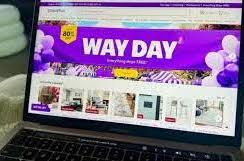Oh wow, I could've gotten scammed by a fake Wayfair website! I tried to help someone find a stove by googling "buy a cheap stove" since the Memorial Day sales are today. On Google Wayfair came up first with a Whirlpool standard stove listed at an incredible price of $135 plus a deal further reducing the stove to $115! In Manhattan I bought a new stove in 2019, so I knew this price seemed too good to be true. According to the listing on the very professional-looking Wayfair website, there were only 11 stoves left and time was ticking, the doorbuster price ended in 3 minutes!!
I called Wayfair -- the retailer -- as I always do to make major purchases, and together the customer associate and I discovered I was on a website that was impersonating Wayfair. The scammer was branding Wayfair's logo and stealing its design. They listed fake too good to be true discounts with detailed descriptions and multiple photos of products that didn't really exist.
These fake websites are after what is called "data harvesting" -- attempting to steal our personal and financial information.
Thankfully I didn't try to buy online, but called Wayfair to ask why the stove was so cheap. The price seemed too good to be true because it was!
Only then did I notice the stove had no item number, and the URL of the scammer website was different (not the official www.wayfair.com).
This is where it ended for me, but other ways to spot fake retailer websites include: no clear contact information such as a telephone number or business address; the lack of a valid SSL certificate, indicated by "https" and a padlock icon in the address bar. Sometimes the fake websites have misspellings or poor grammar, or unusual payment methods like gift cards, cryptocurrency or payment apps.

